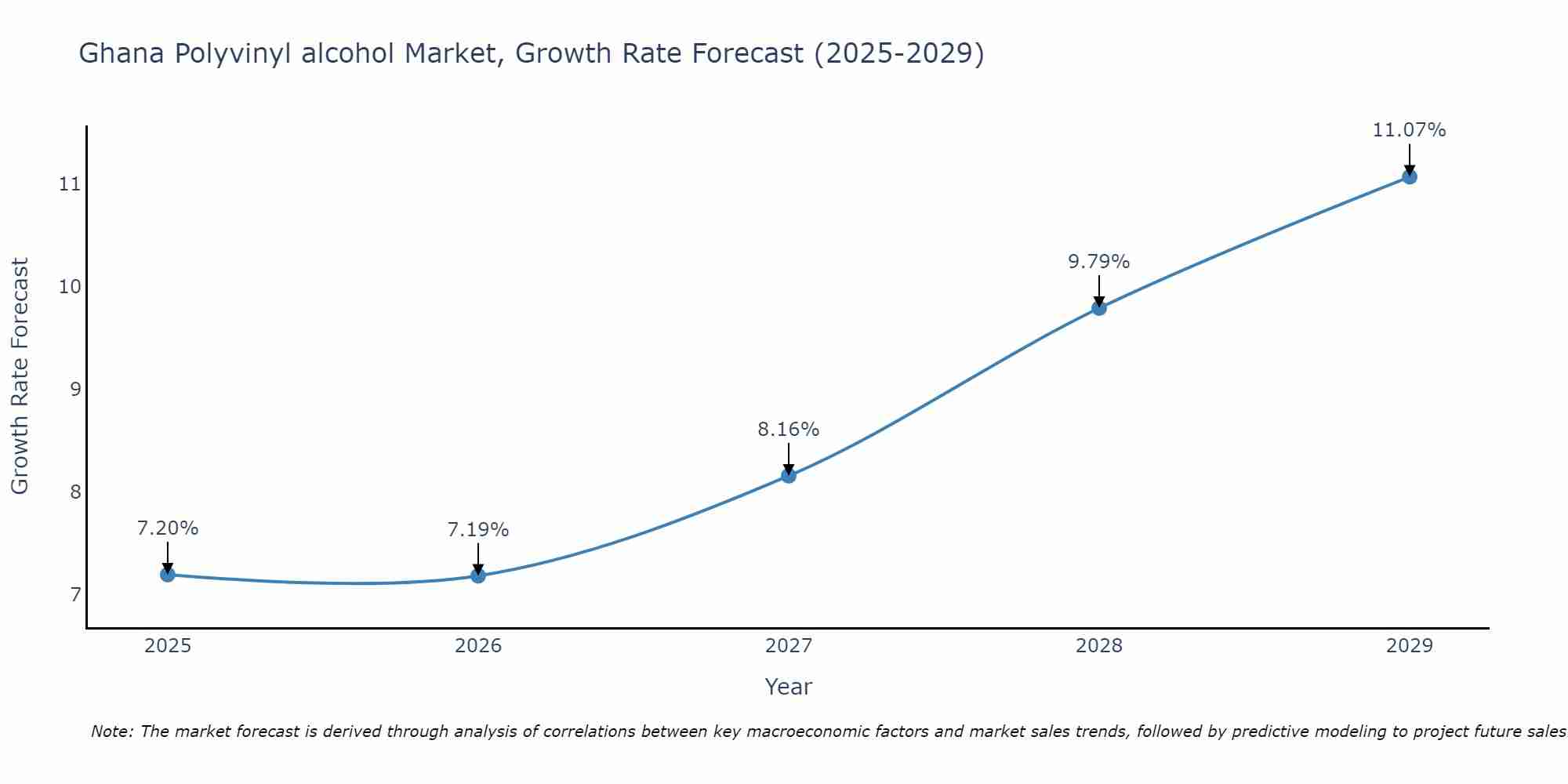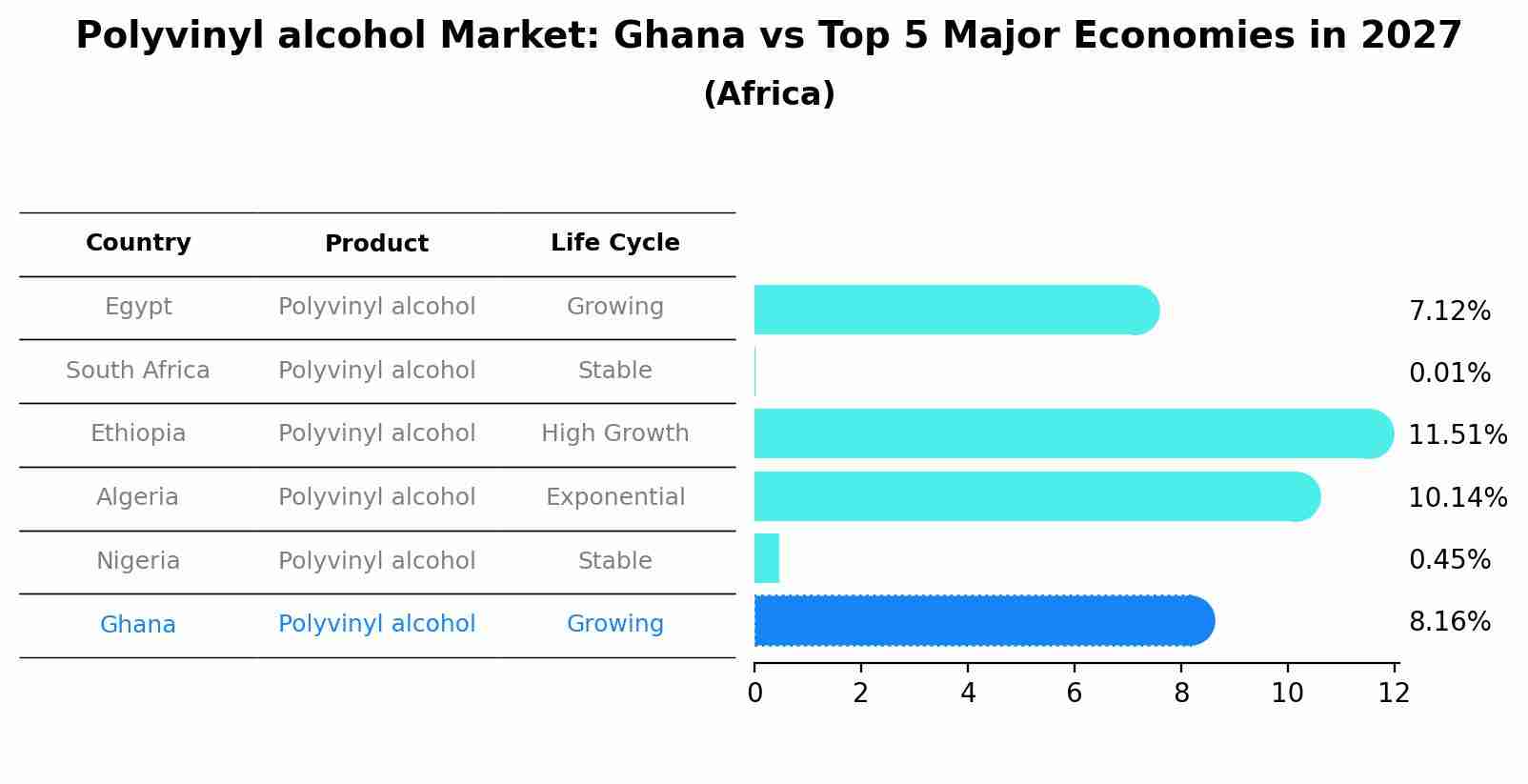Ghana Polyvinyl alcohol Market (2025-2031) Outlook | Companies, Size, Revenue, Analysis, Industry, Forecast, Value, Share, Trends & Growth
| Product Code: ETC092115 | Publication Date: Jun 2021 | Updated Date: Jun 2025 | Product Type: Report | |
| Publisher: 6Wresearch | Author: Shubham Deep | No. of Pages: 70 | No. of Figures: 35 | No. of Tables: 5 |
Ghana Polyvinyl alcohol Market Size Growth Rate
The Ghana Polyvinyl alcohol Market is projected to witness mixed growth rate patterns during 2025 to 2029. Commencing at 7.20% in 2025, growth builds up to 11.07% by 2029.

Polyvinyl alcohol Market: Ghana vs Top 5 Major Economies in 2027 (Africa)
By 2027, the Polyvinyl alcohol market in Ghana is anticipated to reach a growth rate of 8.16%, as part of an increasingly competitive Africa region, where Egypt remains at the forefront, supported by South Africa, Ethiopia, Algeria and Nigeria, driving innovations and market adoption across sectors.

Ghana Polyvinyl alcohol Market Overview
The Ghana Polyvinyl alcohol (PVA) market is experiencing steady growth driven by its widespread applications in industries such as textiles, construction, packaging, and paper production. PVA is valued for its adhesive and emulsifying properties, making it a versatile material in various manufacturing processes. The market is also benefiting from increasing investments in infrastructure development and the growing demand for eco-friendly packaging solutions. Key players in the Ghana PVA market are focusing on product innovation and sustainable practices to meet the evolving needs of consumers and regulatory requirements. With a favorable economic outlook and a rising emphasis on sustainable products, the Ghana PVA market is poised for further expansion in the coming years.
Ghana Polyvinyl alcohol Market Trends
The Ghana Polyvinyl alcohol market is experiencing growth due to increasing demand from various industries such as textiles, construction, and packaging. The rising awareness about the benefits of using Polyvinyl alcohol, such as its biodegradability and versatility, is driving its uptake in the market. Additionally, the government`s initiatives to promote sustainable practices and eco-friendly products are also contributing to the market growth. Manufacturers are focusing on developing innovative PVA products to cater to the evolving consumer needs. However, challenges like fluctuating prices of raw materials and intense market competition are impacting the market dynamics. Overall, the Ghana Polyvinyl alcohol market is poised for further expansion as industries continue to prioritize sustainability and environmental consciousness in their operations.
Ghana Polyvinyl alcohol Market Challenges
The Ghana Polyvinyl alcohol market faces several challenges, including limited awareness about the benefits and applications of the product among potential end-users, leading to a smaller market size than its full potential. Additionally, the availability of substitutes and competing products in the market poses a challenge for Polyvinyl alcohol manufacturers to differentiate their products and convince consumers of its superior qualities. Infrastructure limitations, such as inadequate storage and transportation facilities, also hinder the growth of the market by increasing costs and lead times. Moreover, fluctuations in raw material prices and currency exchange rates can impact the profitability of Polyvinyl alcohol manufacturers in Ghana, making it difficult to maintain competitive pricing in the market. Addressing these challenges will be crucial for the sustainable growth of the Polyvinyl alcohol market in Ghana.
Ghana Polyvinyl alcohol Market Investment Opportunities
Investment opportunities in the Ghana Polyvinyl alcohol market include potential for growth in various industries such as textiles, adhesives, construction, and packaging due to the versatile properties of Polyvinyl alcohol. With increasing demand for eco-friendly and sustainable products, there is a growing opportunity for manufacturers to develop biodegradable and water-soluble products using Polyvinyl alcohol. Additionally, the government`s focus on industrialization and infrastructure development in Ghana provides a conducive environment for investment in the Polyvinyl alcohol sector. Investors can explore partnerships with local manufacturers, research and development initiatives for new applications, and distribution networks to capitalize on the expanding market for Polyvinyl alcohol in Ghana.
Ghana Polyvinyl alcohol Market Government Policy
Government policies related to the Ghana Polyvinyl alcohol market are aimed at promoting local production, reducing import dependency, and enhancing overall competitiveness. The government has implemented measures such as providing tax incentives and subsidies to local manufacturers, promoting research and development activities in the industry, and enforcing strict quality standards to ensure product safety and compliance. Additionally, there are regulations in place to monitor environmental impact and ensure sustainable production practices within the Polyvinyl alcohol market. These policies are designed to support the growth of the domestic Polyvinyl alcohol industry, create employment opportunities, and contribute to the overall economic development of Ghana.
Ghana Polyvinyl alcohol Market Future Outlook
The Ghana Polyvinyl alcohol market is expected to experience steady growth in the coming years due to increasing demand across various industries such as packaging, textile, construction, and electronics. The market is likely to be driven by factors such as the country`s growing manufacturing sector, infrastructure development projects, and the rising consumer preference for eco-friendly and sustainable materials. Additionally, the government`s focus on promoting industrialization and attracting foreign investments is expected to further boost the demand for Polyvinyl alcohol in Ghana. However, challenges such as price volatility of raw materials and fluctuating global market conditions may impact the market growth to some extent. Overall, the Ghana Polyvinyl alcohol market is poised for expansion with opportunities for innovation and market diversification.
Key Highlights of the Report:
- Ghana Polyvinyl alcohol Market Outlook
- Market Size of Ghana Polyvinyl alcohol Market, 2021
- Forecast of Ghana Polyvinyl alcohol Market, 2031
- Historical Data and Forecast of Ghana Polyvinyl alcohol Revenues & Volume for the Period 2021 - 2031
- Ghana Polyvinyl alcohol Market Trend Evolution
- Ghana Polyvinyl alcohol Market Drivers and Challenges
- Ghana Polyvinyl alcohol Price Trends
- Ghana Polyvinyl alcohol Porter's Five Forces
- Ghana Polyvinyl alcohol Industry Life Cycle
- Historical Data and Forecast of Ghana Polyvinyl alcohol Market Revenues & Volume By Grade for the Period 2021 - 2031
- Historical Data and Forecast of Ghana Polyvinyl alcohol Market Revenues & Volume By Partially Hydrolyzed for the Period 2021 - 2031
- Historical Data and Forecast of Ghana Polyvinyl alcohol Market Revenues & Volume By Fully Hydrolyzed for the Period 2021 - 2031
- Historical Data and Forecast of Ghana Polyvinyl alcohol Market Revenues & Volume By End-use Industry for the Period 2021 - 2031
- Historical Data and Forecast of Ghana Polyvinyl alcohol Market Revenues & Volume By Food Packaging for the Period 2021 - 2031
- Historical Data and Forecast of Ghana Polyvinyl alcohol Market Revenues & Volume By Textile for the Period 2021 - 2031
- Historical Data and Forecast of Ghana Polyvinyl alcohol Market Revenues & Volume By Paper for the Period 2021 - 2031
- Historical Data and Forecast of Ghana Polyvinyl alcohol Market Revenues & Volume By Medical for the Period 2021 - 2031
- Historical Data and Forecast of Ghana Polyvinyl alcohol Market Revenues & Volume By Construction for the Period 2021 - 2031
- Historical Data and Forecast of Ghana Polyvinyl alcohol Market Revenues & Volume By Electronics for the Period 2021 - 2031
- Ghana Polyvinyl alcohol Import Export Trade Statistics
- Market Opportunity Assessment By Grade
- Market Opportunity Assessment By End-use Industry
- Ghana Polyvinyl alcohol Top Companies Market Share
- Ghana Polyvinyl alcohol Competitive Benchmarking By Technical and Operational Parameters
- Ghana Polyvinyl alcohol Company Profiles
- Ghana Polyvinyl alcohol Key Strategic Recommendations
Frequently Asked Questions About the Market Study (FAQs):
- Single User License$ 1,995
- Department License$ 2,400
- Site License$ 3,120
- Global License$ 3,795
Search
Thought Leadership and Analyst Meet
Our Clients
Related Reports
- Germany Breakfast Food Market (2026-2032) | Industry, Share, Growth, Size, Companies, Value, Analysis, Revenue, Trends, Forecast & Outlook
- Australia Briquette Market (2025-2031) | Growth, Size, Revenue, Forecast, Analysis, Trends, Value, Share, Industry & Companies
- Vietnam System Integrator Market (2025-2031) | Size, Companies, Analysis, Industry, Value, Forecast, Growth, Trends, Revenue & Share
- ASEAN and Thailand Brain Health Supplements Market (2025-2031) | Strategy, Consumer Insights, Analysis, Investment Trends, Opportunities, Growth, Size, Share, Industry, Revenue, Segments, Value, Segmentation, Supply, Forecast, Restraints, Outlook, Competition, Drivers, Trends, Demand, Pricing Analysis, Competitive, Strategic Insights, Companies, Challenges
- ASEAN Bearings Market (2025-2031) | Strategy, Consumer Insights, Analysis, Investment Trends, Opportunities, Growth, Size, Share, Industry, Revenue, Segments, Value, Segmentation, Supply, Forecast, Restraints, Outlook, Competition, Drivers, Trends, Demand, Pricing Analysis, Competitive, Strategic Insights, Companies, Challenges
- Europe Flooring Market (2025-2031) | Outlook, Share, Industry, Trends, Forecast, Companies, Revenue, Size, Analysis, Growth & Value
- Saudi Arabia Manlift Market (2025-2031) | Outlook, Size, Growth, Trends, Companies, Industry, Revenue, Value, Share, Forecast & Analysis
- Uganda Excavator, Crane, and Wheel Loaders Market (2025-2031) | Strategy, Consumer Insights, Analysis, Investment Trends, Opportunities, Growth, Size, Share, Industry, Revenue, Segments, Value, Segmentation, Supply, Forecast, Restraints, Outlook, Competition, Drivers, Trends, Demand, Pricing Analysis, Competitive, Strategic Insights, Companies, Challenges
- Rwanda Excavator, Crane, and Wheel Loaders Market (2025-2031) | Strategy, Consumer Insights, Analysis, Investment Trends, Opportunities, Growth, Size, Share, Industry, Revenue, Segments, Value, Segmentation, Supply, Forecast, Restraints, Outlook, Competition, Drivers, Trends, Demand, Pricing Analysis, Competitive, Strategic Insights, Companies, Challenges
- Kenya Excavator, Crane, and Wheel Loaders Market (2025-2031) | Strategy, Consumer Insights, Analysis, Investment Trends, Opportunities, Growth, Size, Share, Industry, Revenue, Segments, Value, Segmentation, Supply, Forecast, Restraints, Outlook, Competition, Drivers, Trends, Demand, Pricing Analysis, Competitive, Strategic Insights, Companies, Challenges
Industry Events and Analyst Meet
Whitepaper
- Middle East & Africa Commercial Security Market Click here to view more.
- Middle East & Africa Fire Safety Systems & Equipment Market Click here to view more.
- GCC Drone Market Click here to view more.
- Middle East Lighting Fixture Market Click here to view more.
- GCC Physical & Perimeter Security Market Click here to view more.
6WResearch In News
- Doha a strategic location for EV manufacturing hub: IPA Qatar
- Demand for luxury TVs surging in the GCC, says Samsung
- Empowering Growth: The Thriving Journey of Bangladesh’s Cable Industry
- Demand for luxury TVs surging in the GCC, says Samsung
- Video call with a traditional healer? Once unthinkable, it’s now common in South Africa
- Intelligent Buildings To Smooth GCC’s Path To Net Zero


















